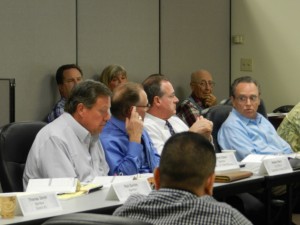
Just as it appeared Wednesday’s meeting of the Stanislaus Water Advisory Committee (WAC) was going to conclude another session of deferred action, Stanislaus County Supervisor Terry Withrow lit up the room.
“I was talking to Jim and he was pretty adamant about putting a moratorium on the east side,” said Withrow. “And right now he’s got the votes to do it.”
No one had to be told “Jim” was Stanislaus County Supervisor Jim DeMartini. Almost everyone present remembered DeMartini’s abrupt departure from the committee. His now notorious comment that the sole reason for the committee’s formation was to provide “political cover” for supervisors unwilling to take action against unsustainable extraction of groundwater on the county’s east side has become part of local folklore. It now appears DeMartini has convinced at least two other supervisors to vote in favor of a moratorium.
In the uproar that followed Withrow’s news, the Stanislaus Water Advisory Committee finally confronted the one fact critics have said they’ve been avoiding for over a year: Absent a miracle, adding tens of thousands of acres of nut orchards solely dependent on groundwater can only drain aquifers, which almost everyone agrees is an “undesirable consequence.”
“Undesirable consequences” are suddenly important, because they are part of the language of the state’s new groundwater regulations.
“We need to put a pause on what’s going on the east side,” said Withrow. “Partners sometimes have to talk about tough things. We can start talking about it today.”
“You aren’t going to section off half this valley,” said well driller Sean Roddy. “It’s all or nothing. They (eastside farmers) know their groundwater law.”
“I want data,” said hydrogeologist Ray Kablanow. “A moratorium is going to cause a problem without data.”
The call for data has been a frequent refrain during the committee’s existence, but it’s easy to see why Jim DeMartini thinks it’s a delaying tactic. All farmers know how much water a given crop needs to be productive. Since almost all the new plantings on the county’s east side are almond orchards, it’s common knowledge they need at least three acre feet of water a year, even more if they are to achieve maximum production. There are at least thirty thousand new acres of almonds in the eastern foothills of Stanislaus County. That’s a minimum of ninety thousand acre feet of water needed year after year.
Stanislaus County geologist Dr. Horacio Ferriz has said that pumping an average of three acre feet of water from aquifers on the east side will lower the water table thirty feet a year. Even in the wettest years, rainfall generally recharges less than one foot of the aquifer per year. It doesn’t take math wizardry to conclude foothills nut farming is unsustainable.
All along, the unspoken impediment to progress for the WAC was the fear that “stakeholders” would sue if restraints were put on adding wells. Nonetheless, it became increasingly evident that without restraints, the only possible consequence was a more rapidly depleted aquifer and all the ensuing “undesirable consequences.”
Now that local entities have the authority to prevent unsustainable extraction of groundwater, it would seem to follow that Stanislaus County Supervisors not only have the right to call a moratorium on new wells, they also have the responsibility.
Some committee members seemed to agree. After the initial uproar from Withrow’s news died down, committee member Mike Lynch said, “A moratorium is a legitimate tool,” to deal with groundwater issues.
“It is a tool. Mike is right,” said Sarge Green, the committee’s hydrological consultant.
It was up to Modesto City Councilman Bill Zoslocki to conclude with comments that no one could ignore:
“Why is there so much fear to release the data?” he said. “It’s going to come across to the public…why is there so much fear? Just get it done. Quit worrying about it.”
Zoslocki might have added that the public already knows farming in the foothills is unsustainable. The real question is why Stanislaus County Supervisors have been so slow to face the facts.

I totally agree with Supervisor DeMartini. I can understand the use of wells to supplement surface water irrigation during drought years where the use of a well is only temporary. But to plant orchards and use wells outside of irrigation districts to irrigate these orchards is just plain wrong and is greed, Land outside of irrrigation districts that don’t have water source costs much less than land with good water rights. This is a case of people purchasing cheaper land to grow permanent crops for 20 years or until the wells run dry. This just isn’t acceptable